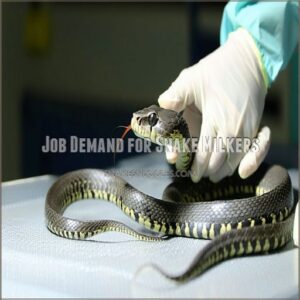This site is supported by our readers. We may earn a commission, at no cost to you, if you purchase through links.

Snake milkers typically earn between $30,000 and $60,000 annually, with monthly wages ranging from $2,500 to $4,000.
Your earnings depend on factors like location, experience, and the snake species you’re extracting venom from.
California and Arizona offer the most lucrative opportunities, where specialized skills can boost your income.
With a bachelor’s degree in zoology or biology, you’ll be handling venomous snakes in research facilities, pharmaceutical companies, and wildlife parks.
It’s a high-stakes job that requires nerves of steel and a passion for science. Think you’ve got what it takes to milk these deadly serpents?
Table Of Contents
- Key Takeaways
- Snake Milker Job Description
- How to Become a Snake Milker?
- Career Prospects of a Snake Milker
- Where Does a Snake Milker Work?
- Average Snake Milker Salary
- Job Demand for Snake Milkers
- Education Requirements for Snake Milkers
- Snake Venom Harvesting and Uses
- Frequently Asked Questions (FAQs)
- What skills are needed to be a snake milker?
- How much do snake catchers get paid in the US?
- What does a snake milker extract from snakes?
- Are there any risks associated with snake milking?
- What kind of snakes do snake milkers typically handle?
- Are there any special certifications or training needed for snake milking?
- Is there potential for advancement in the field of snake milking?
- What are the potential long-term benefits of snake milking?
- Is snake milking dangerous for the milker?
- How long does a snake stay milked?
- Conclusion
Key Takeaways
- You’ll typically earn between $30,000 and $60,000 annually as a snake milker, with monthly wages ranging from $2,500 to $5,000, depending on your expertise and location.
- You’ll need a bachelor’s degree in zoology or biology, specialized training in snake handling, and certification to become a professional snake milker, with opportunities concentrated in states like California and Arizona.
- Your career will involve extracting venom for critical medical research, pharmaceuticals, and antivenom production, working in diverse environments like zoos, research labs, and specialized serpentariums.
- You’ll face high-stakes challenges that require nerves of steel, precise scientific skills, and a deep understanding of venomous snake biology, making this a unique and demanding profession with limited but exciting career progression.
Snake Milker Job Description
If you’ve got nerves of steel and a passion for working with venomous snakes, becoming a snake milker might be your dream career.
You’ll be extracting precious venom for medical research, pharmaceuticals, and antivenom production, all while mastering the art of handling some of the world’s most dangerous reptiles.
Duties and Responsibilities
Ever wondered about the heart-pounding world of venom extraction? As a snake milker, you’ll jump into a high-stakes career that’s anything but ordinary.
Your mission involves mastering the art of snake handling and precision venom collection:
- Safely restrain venomous snakes for controlled venom extraction
- Process and prepare venom samples for critical medical research
- Maintain sterile equipment and follow rigorous safety protocols
This isn’t just a job—it’s a high-wire act of scientific skill. You’ll need nerves of steel and a passion for these fascinating reptiles. While a zoology degree isn’t mandatory, your ability to dance with danger and scientific precision will define your success in this unique profession.
Required Skills and Qualifications
Want to become a snake milker? You’ll need more than just nerves of steel.
Venom handling requires a razor-sharp understanding of snake biology and precision lab skills.
Your toolkit includes a bachelor’s in zoology or biology, plus hands-on training in safety protocols. Ethical considerations are your compass, guiding every interaction with these fascinating creatures.
Forget fancy degrees—passion trumps paperwork. You’ll need quick reflexes, steady hands, and a deep respect for these slithery subjects.
Think you can handle the heat? Master the art of venom extraction, and you’re in for a wild ride. Snake Milking requires more than nerves of steel.
Work Environment and Settings
Snake milkers navigate diverse work environments, from high-tech serpentariums to research universities and wildlife parks.
Your day might involve extracting venom, maintaining lab equipment, or traveling to exotic locations.
With careful precision, you’ll handle endangered species, balancing scientific expertise and ethical considerations while ensuring safety in this unique, challenging profession.
How to Become a Snake Milker?
If you’ve got nerves of steel and a fascination with venomous creatures, becoming a snake milker might be your dream career.
You’ll need a solid background in biology or zoology, specialized training in snake handling, and the courage to work closely with some of nature’s most dangerous reptiles.
Education and Training Requirements
Diving into snake milking demands a strong educational foundation that blends scientific expertise with hands-on skills. Your journey to becoming a professional venom extractor requires careful preparation and strategic learning:
- Pursue a bachelor’s degree in zoology, biology, or related scientific disciplines
- Focus on core science courses like chemistry, toxicology, and animal behavior
- Develop strong mathematical and analytical skills
- Consider specialized minors in wildlife conservation or toxicology
- Build a thorough understanding of reptile biology and ecosystem interactions
The path to mastering venom extraction isn’t just about classroom learning. You’ll need a combination of academic credentials and practical knowledge that transforms theoretical understanding into precise, life-saving techniques.
While no single degree guarantees success, your educational background becomes the critical scaffolding for a career handling some of nature’s most dangerous creatures.
Certification programs and targeted training can elevate your qualifications, making you a sought-after expert in this niche yet fascinating field of scientific exploration.
Hands-on Experience and Specialized Courses
After mastering the theoretical foundations of herpetology, you’ll need to roll up your sleeves and get hands-on experience in venom handling training. Your journey transforms classroom knowledge into real-world skills through strategic apprenticeship programs and field workshops.
| Skill | Training Venue | Time Investment |
|---|---|---|
| Snake Handling | Reptile Sanctuaries | 3-6 months |
| Venom Extraction | Research Centers | 2-4 months |
| Safety Protocols | Professional Workshops | 1-2 months |
| Ethical Practices | Conservation Programs | Ongoing |
| Advanced Techniques | Specialized Labs | 6-12 months |
Professional snake milkers don’t just learn – they immerse themselves in thorough training programs that blend technical expertise with practical skills. You’ll learn to navigate the delicate art of venom extraction, understanding each snake’s unique behavior and temperament. These programs aren’t just about technique; they’re about developing a deep respect for these incredible creatures and the critical medical research they support. Your dedication will separate you from amateur enthusiasts, positioning you as a true professional in this high-stakes, precision-driven career.
Certification and Licensing
Got your ticket to the snake milking world, and are you aware of the snake laws that regulate venomous snake handling?
Licensing requirements vary by state, so do your homework before jumping in.
Most certification bodies demand specialized snake milking training and proof of hands-on experience.
You’ll need to navigate reciprocal licensing agreements, complete continuing education courses, and stay sharp with venom milking career updates.
Pro tip: Network with experienced snake milkers to understand the ins and outs of these qualifications.
Career Prospects of a Snake Milker
If you’re eyeing a career that’s both risky and rewarding, snake milking might just be your venomous calling.
You’ll navigate a niche field where expertise in herpetology, precise venom extraction, and a fearless attitude can turn your passion for serpents into a unique professional path.
Job Demand and Growth Opportunities
Ready to master the snake milker career landscape? Your hands-on skills in biological sciences reveal exciting job opportunities across research facilities, pharmaceutical companies, and medical labs worldwide.
Future prospects shine bright for those willing to specialize in venom extraction and snake handling. Global demand for snake milkers continues growing, especially in antivenoms research and medical development.
Industry trends point to expanding career paths in serpentariums, universities, and conservation centers. Job security looks promising as the need for specialized venom expertise increases.
With a solid understanding of venomous snake habitats, professionals can better understand the intricacies of snake milking.
Whether you’re eyeing snake milking jobs in research or veterinary settings, your unique skills can turn this niche profession into a thrilling career adventure that’s anything but ordinary.
Average Salary and Factors Affecting Earnings
If you’re eyeing the snake milking world, your salary can slither between $2,500 to $4,000 monthly.
Your earnings depend on geographic location, venom type, and experience level. California and Arizona offer top-dollar opportunities, while your expertise in handling venomous snakes can boost your snake milker salary range.
Specialized skills in rare species like King Cobra venom extraction can turn your passion into a lucrative career.
Employers value precision, so sharpen those snake-handling chops to maximize your income potential. snake milker salary
Advancement and Senior Roles
Want to climb the snake milking career ladder? Your salary potential skyrockets with strategic moves. Professional growth isn’t just about handling venomous snakes – it’s about mastering your craft and expanding your expertise.
- Management roles boost earning potential
- Team leadership opportunities emerge
- Expert consultant positions increase income
- Research director tracks open higher salaries
Your journey from entry-level milker to respected professional starts now.
Where Does a Snake Milker Work?
Ever wondered where snake milkers wrestle with their venomous companions?
You’ll find these daring professionals working in diverse environments like zoos, research labs, universities, and specialized serpentariums.
They extract life-saving venom for medical research and antivenom production.
Zoos, Universities, and Serpentariums
Your snake milker career might kick off in zoos, universities, or serpentariums – hotspots for venom sourcing and research.
These institutions offer prime opportunities to master snake handling and extraction techniques.
You’ll work closely with herpetologists, gaining hands-on experience in ethical venom collection while exploring diverse career paths that blend scientific curiosity with animal expertise.
To learn more about the specific products and tools used in this field, such as those sold online at snake milker salary zoo products, can be a helpful resource for your professional development.
Laboratories and Contract Research Facilities
After exploring zoo environments, snake milkers often find their scientific groove in specialized laboratories and contract research facilities. These high-precision workspaces demand more than just snake handling skills—they require a laser-focused approach to venom extraction and research.
- Master lab safety protocols
- Understand complex venom research techniques
- Navigate contract role requirements
- Develop advanced animal handling skills
- Track emerging industry trends
The average snake milker salary hovers around $35,000, but contract research roles can bump your earnings higher. Facilities seek professionals with solid zoology backgrounds who can transform snake venom into groundbreaking medical discoveries. Your ability to extract and analyze venom precisely determines your success in these demanding yet fascinating scientific environments.
Freelancing and Black Market Trade
Five snake milkers secretly tap into lucrative freelance opportunities beyond traditional research roles. The underground market for venom extraction offers tempting financial rewards, but treads a dangerous legal line.
| Risk Level | Potential Earnings | Legal Status | Ethical Concerns | Market Demand |
|---|---|---|---|---|
| High | $450-$750/gram | Questionable | Significant | Volatile |
| Moderate | $150-$300/sample | Restricted | Moderate | Growing |
| Low | $50-$100/transaction | Compliant | Minimal | Stable |
| Extreme | $2,000-$4,000/gram | Illegal | Critical | Unpredictable |
| Variable | Negotiable | Gray Area | Controversial | Emerging |
The allure of quick cash comes with substantial professional and personal risks.
Average Snake Milker Salary
If you’re eyeing a career as a snake milker, you’ll want to know what your potential paycheck looks like in this high-stakes, venomous profession.
Expect an average monthly salary of around $2,500.
Opportunities to earn more are based on your expertise, location, and the specific snake species you’re working with.
Median Salary and Hourly Rate
If you’re eyeing the snake milker career path, get ready for a salary rollercoaster that’ll keep you on your toes. The median snake milker salary hovers around $66,350.
Earnings are influenced by:
- Venom yield expertise
- Specialized scientific skills
- Animal handling precision
Your wages dance to the rhythm of your qualifications. Experienced professionals can command higher snake milker wages, with hourly rates typically ranging from $18 to $22. The more you know about venomous creatures, the more green you’ll see in your paycheck.
Regional Variations and Higher Paying States
Venomous gold mines like California and Arizona offer snake milkers juicy salary ranges that’ll make your wallet hiss with excitement.
Your snake milker salary can dance with the cost of living, climbing higher in regions with intense demand for antivenom research and specialized wildlife handling.
Strategic state selection could boost your earnings potential dramatically.
Impact of Snake Species and Additional Duties
Your snake milker salary can skyrocket by mastering the art of venom extraction across different snake species. The more rare and valuable the breed, the higher your potential earnings.
Consider these key salary boosters:
- Specialize in high-value venom species like King Cobras or Death Stalker Scorpions
- Develop additional skills in veterinary care and research
- Gain certifications from professional herpetology organizations
You can find more information on Chewy’s snake milker resources to help you get started.
Each snake species brings unique challenges and compensation opportunities. Professional networks like the American Society of Ichthyologists and Herpetologists can open doors to lucrative venom harvesting contracts.
While the black market tempts some, staying ethical and legal is essential. Your expertise in venom extraction, combined with advanced scientific knowledge, can transform a standard snake milker role into a highly profitable career that balances risk, skill, and scientific contribution.
Job Demand for Snake Milkers
If you’re eyeing a career that’s more venomous than your average 9-to-5, snake milking might just be your perfect match.
With a growing need for antivenom research and expanding medical applications, you’ll find this niche field offers unique opportunities for those brave enough to handle the world’s most dangerous serpents.
Importance of Venom for Research and Antivenom Production
Deep within the intricate world of snake milking lies a critical mission: harnessing venom for life-saving research and antivenom production. These specialized professionals play a pivotal role in extracting precious biological resources that become medical miracles.
| Venom Application | Impact |
|---|---|
| Antivenom Development | Saves thousands of snakebite victims annually |
| Medical Research | Drives breakthrough treatments for diseases |
| Pharmaceutical Innovation | Creates potential treatments for neurological conditions |
Snake venom isn’t just a dangerous substance—it’s a scientific goldmine. Researchers transform these potent extracts into targeted medicines, exploring treatments for Parkinson’s, Alzheimer’s, and cancer. The precision required in venom extraction demands experts who understand serpent biology at its core.
From developing life-saving antivenoms to pioneering medical breakthroughs, snake milkers are the unsung heroes bridging the gap between nature’s most dangerous creatures and human medical advancement. Their work represents a delicate dance of scientific curiosity and calculated risk.
Increasing Awareness and Need for Snakebite Treatments
In the shadowy area of global health, the snakebite crisis demands urgent attention.
Snake venom extraction isn’t just a niche profession—it’s a lifeline for millions facing deadly bites worldwide.
As the demand for skilled snake milking professionals drives up antivenom salaries check out antivenom salary on Chewy, public awareness and funding research are essential in battling this often-overlooked medical challenge.
Toxicology programs and animal conservation internships are sparking interest among young professionals keen to make a difference.
By supporting antivenom development and understanding snake milker contributions, we’re not just saving lives—we’re bridging critical gaps in global healthcare.
Every venom collected represents hope for communities most vulnerable to snakebite tragedies.
Limited Career Progression and Senior Roles
Battling the bottleneck of career limitations isn’t for the faint-hearted in snake milking. While snakebite treatments keep demand steady, advancement prospects remain as tight as a snake’s coil.
Most professionals hit a salary ceiling pretty quickly, with few senior positions to climb toward. You might start passionate about reptiles, but the industry’s narrow growth means your career ladder looks more like a short stepladder.
Experienced snake milkers often juggle multiple roles – researcher, educator, and venom extraction specialist – to keep things interesting. Some leverage their unique skills into consulting or specialized research positions, but these opportunities are rare.
To further complicate matters, snake milkers must also navigate the complex landscape of state laws and permits.
The snake milker job outlook hinges more on individual passion and networking than traditional career progression. It’s a field where your love of snakes matters more than corporate climbing.
Education Requirements for Snake Milkers
If you’re itching to turn snake venom into a career, you’ll want to arm yourself with a solid educational foundation in biology, zoology, or a related scientific field.
Your path to becoming a snake milker involves more than just nerves of steel—you’ll need a Bachelor’s degree, specialized training in venomous snake handling, and a passion for working with some of nature’s most dangerous creatures.
Recommended Degrees and Specializations
Every aspiring snake milker needs a solid academic foundation to tame this high-stakes career path.
A bachelor’s degree in zoology, biology, or herpetology that’ll set you up for venom extraction success.
Top universities offer specialized programs that blend scientific rigor with hands-on training.
While no single degree guarantees entry, courses in toxicology and conservation give you a competitive edge.
Think of your education as your first line of defense—a critical shield in this fascinating, dangerous profession.
Skills and Aptitude in Biological Sciences
Mastering three critical skill sets sets you apart in the snake milking world: herpetology expertise, venom chemistry, and razor-sharp animal handling techniques.
You’ll need a rock-solid foundation in biological sciences that goes beyond basic knowledge. Lab techniques and research skills are your secret weapons, transforming you from an average candidate to a top-tier venom professional.
Understanding the complex mixture of proteins and enzymes, including phospholipases A2, is also essential for success in this field. Toxicology insights give you an extra edge, helping you understand the intricate molecular magic of snake venom.
Think you’ve got what it takes to jump into this venomous career?
Certification and Licensing Requirements
If you’re eyeing a career as a snake milker, licensing variations can make or break your professional journey.
Required certifications aren’t just paperwork—they’re your golden ticket to handling venomous serpents legally.
Different regions have unique legal permits, so research your local snake milking certification requirements carefully.
Whether you’re in California or Arizona, you’ll need specialized training that goes beyond a basic herpetology degree.
Renewal processes guarantee you’re always up to date on safety protocols.
Think of these certifications as your professional armor, protecting both you and the snakes you’ll work with in this high-stakes, adrenaline-fueled career.
Snake Venom Harvesting and Uses
Have you ever wondered how those dangerous snake venoms transform from a deadly substance into life-saving medicines?
Snake venom harvesting isn’t just about risking your neck with fanged serpents, but it’s a precise scientific process.
it’s a precise scientific process that turns toxic liquids into groundbreaking treatments for conditions like Alzheimer’s, Parkinson’s, and even potential cancer therapies.
Venom Extraction Techniques and Precision
When your biology background meets snake handling skills, venom extraction becomes an art form.
You’ll need steady hands and nerves of steel to collect precious venom using specialized milking tools.
Safety protocols are your best friend – protecting both you and the snake during extraction.
Precision matters: gently massage the snake’s head to maximize venom yield without causing stress.
Professional snake milkers can process up to 150 snakes in just two hours, turning each careful squeeze into liquid gold for antivenom production.
It’s a high-stakes dance of expertise and respect for these remarkable creatures.
Applications in Medicines, Anti-venoms, and Cosmetics
Venom’s liquid gold isn’t just a dangerous secretion—it’s a scientific marvel transforming multiple industries.
From lifesaving antivenom production to cutting-edge medical treatments, snake venom delivers remarkable potential.
Pharmaceutical researchers reveal its secrets, developing breakthrough medicines for conditions like Parkinson’s and creating targeted pain management solutions.
Cosmetic innovators even harness its properties for anti-aging products, proving that this potent substance’s value extends far beyond its reptilian origins. The venom market continues to expand, promising exciting future research.
Research, Conservation, and Veterinary Duties
Beyond extracting venom for medical marvels, snake milkers play a critical role in wildlife conservation and veterinary research.
You’ll wrestle with more than just serpents – you’ll tackle ethical considerations surrounding animal welfare and groundbreaking scientific discovery.
Your hands become instruments of knowledge, carefully extracting life-saving compounds while supporting herpetologist teams worldwide. This isn’t just a job; it’s a mission to understand nature’s most misunderstood creatures.
From studying snake behavior to developing cutting-edge treatments, you’ll bridge the gap between dangerous predators and human medical breakthroughs. The snake milker salary mightn’t make you rich, but the impact? Absolutely priceless. Each venom drop tells a story of survival, science, and unexpected connections.
Frequently Asked Questions (FAQs)
What skills are needed to be a snake milker?
Ever wrestled with a snake’s secrets?
To become a snake milker, you’ll need razor-sharp biology skills.
expert handling techniques, precise lab expertise,
and a passion for these slithery creatures that’ll make most people run.
How much do snake catchers get paid in the US?
Snake catchers in the US can earn around $87 to $75 per hour.
Your pay depends on location, experience, and whether you’re catching pythons, rattlesnakes, or other species.
Bonus payments for each snake caught can boost your income.
What does a snake milker extract from snakes?
Like a skilled surgeon extracting liquid gold, you’ll carefully collect venom from venomous snakes’ fangs.
You’ll draw out a potent, valuable substance used in medical research, antivenom production, and cutting-edge pharmaceutical developments.
Are there any risks associated with snake milking?
You’re facing serious risks when milking venomous snakes, including potential fatal bites, allergic reactions to venom, and psychological stress.
Proper training, protective gear, and precise handling techniques are essential to minimizing these life-threatening dangers.
What kind of snakes do snake milkers typically handle?
You’ll handle deadly serpents like coastal taipans, black mambas, cobras, and Russell’s vipers.
Skilled milkers wrangle the world’s most venomous snakes, extracting potent toxins for critical antivenom production and medical research.
Are there any special certifications or training needed for snake milking?
To become a snake milker, you’ll need specialized training in venomous snake handling.
specialized training and a biology or zoology degree are helpful.
Certifications from recognized wildlife or herpetology institutes demonstrate your expertise and safety skills.
Is there potential for advancement in the field of snake milking?
Advancement in snake milking hinges on specialized research, pharmaceutical work, or moving to related fields like herpetology, toxicology, and wildlife conservation.
Networking, advanced degrees, and developing unique expertise can open exciting career opportunities.
What are the potential long-term benefits of snake milking?
Groovy science meets medical miracles!
You’ll discover groundbreaking treatments, from pain medications to potential cancer therapies.
While contributing to vital antivenom research and expanding human understanding of snake venom’s incredible healing potential.
Is snake milking dangerous for the milker?
You’re walking a razor’s edge with snake milking.
One wrong move means potential deadly venom injection.
While experts minimize risks through precise handling, you’ll face constant danger that demands absolute focus and lightning-fast reflexes.
How long does a snake stay milked?
Like a tightly squeezed lemon, a snake can be milked every 2-3 months, depending on its health and species.
You’ll want to give it ample recovery time between extractions to maintain the snake’s venom production and overall well-being.
Conclusion
Ever wondered if a snake milker’s salary could slither past your wildest dreams?
You’ll need more than just courage—you’ll need a solid educational background and nerves of steel.
While the snake milker salary ranges from $30,000 to $60,000, it’s not just about money.
It’s a unique career that combines scientific passion with high-risk precision.
If you’re willing to jump into this venomous world, you might just find a career that’s as thrilling as it’s challenging.


















